Abstract
Growth conditions for Azospirillum brasilense Sp6 were devised for maximal expression of glutamate synthase. The enzyme levels were largely affected by the type and concentration of the nitrogen source. A 10-fold increase in the synthesis of the enzyme was observed at a limiting concentration of ammonia. The enzyme was purified to homogeneity by a procedure which was fairly rapid and allowed a good recovery of enzyme (30%). Azospirillum glutamate synthase is a complex iron-sulfur flavoprotein with a stoichiometry of 1 flavin adenine dinucleotide:1 flavin mononucleotide:8 Fe:8 S per protomer with a molecular weight of 185,000. The protomer is composed of two dissimilar subunits with molecular weights of 135,000 and 50,000. Kinetic parameters were determined. Km values for NADPH, 2-oxoglutarate, and L-glutamine were 6.25, 29, and 450 microM, respectively. The optimum pH was about 7.5. Complete reduction of the enzyme under anaerobic conditions was obtained either by NADPH (in the presence of a regenerating system) or dithionite or by photochemical reduction (in the presence of EDTA and 5-deazariboflavin). No stable long-wavelength intermediates were observed.
Full text
PDF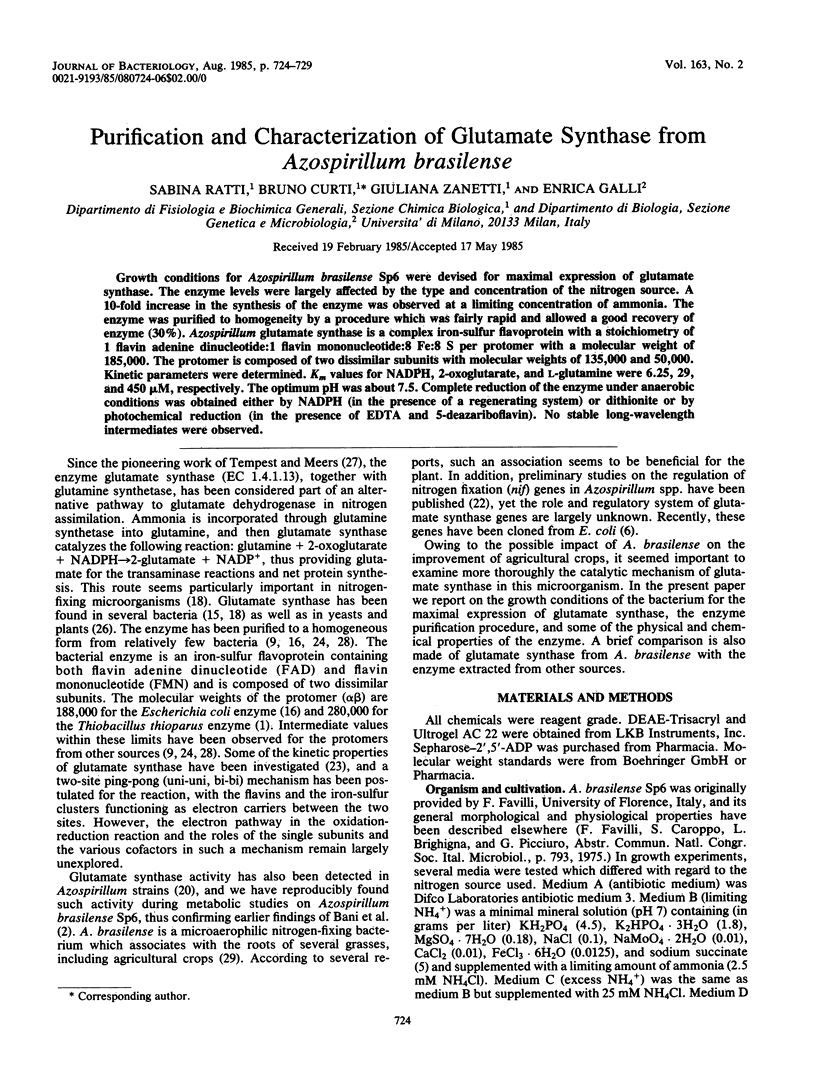
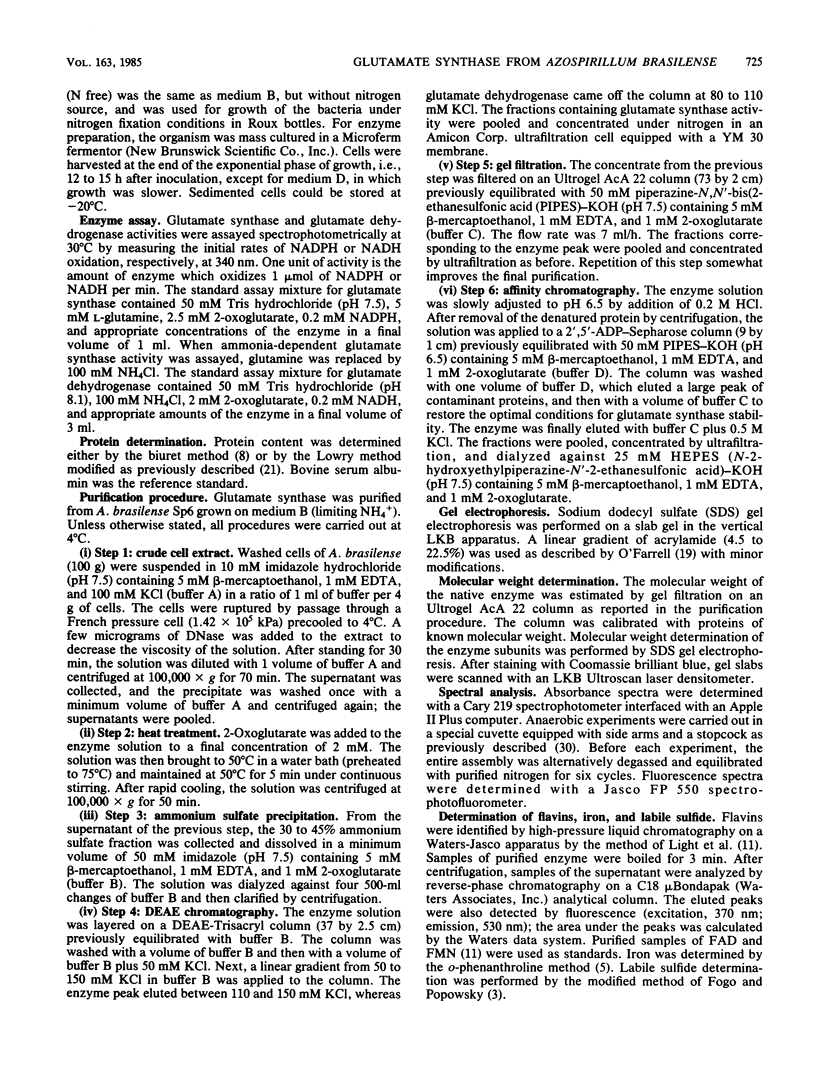
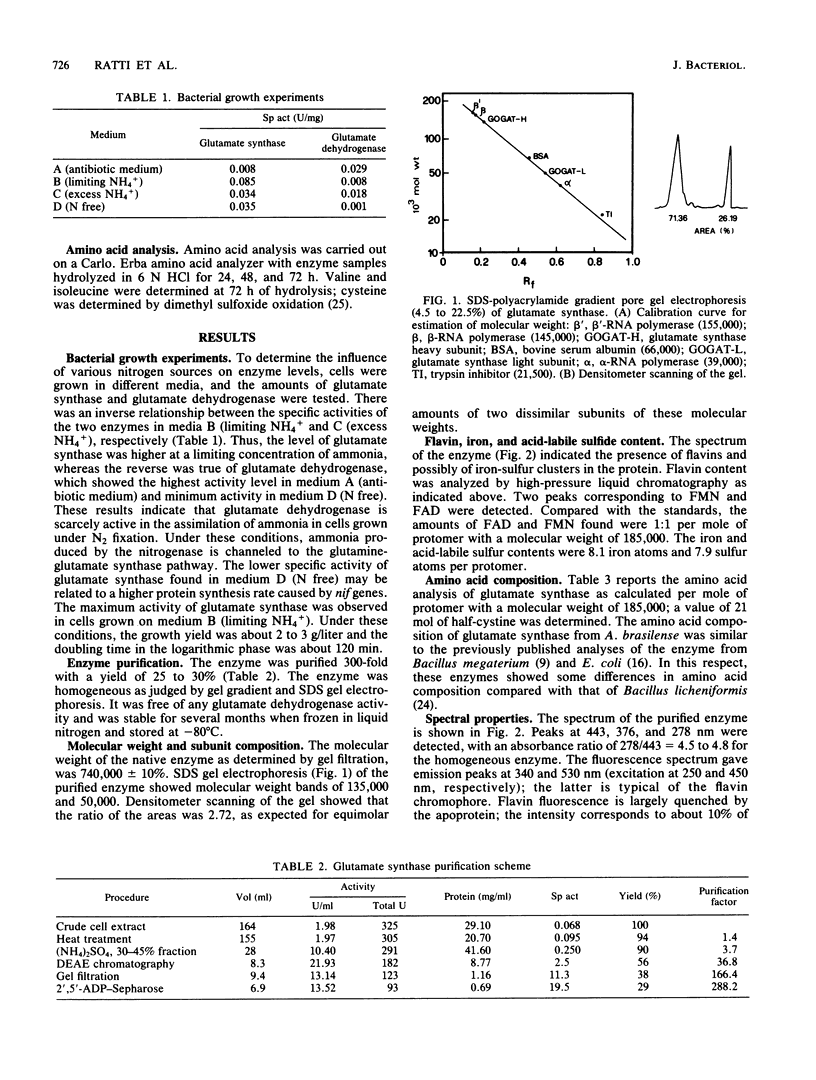
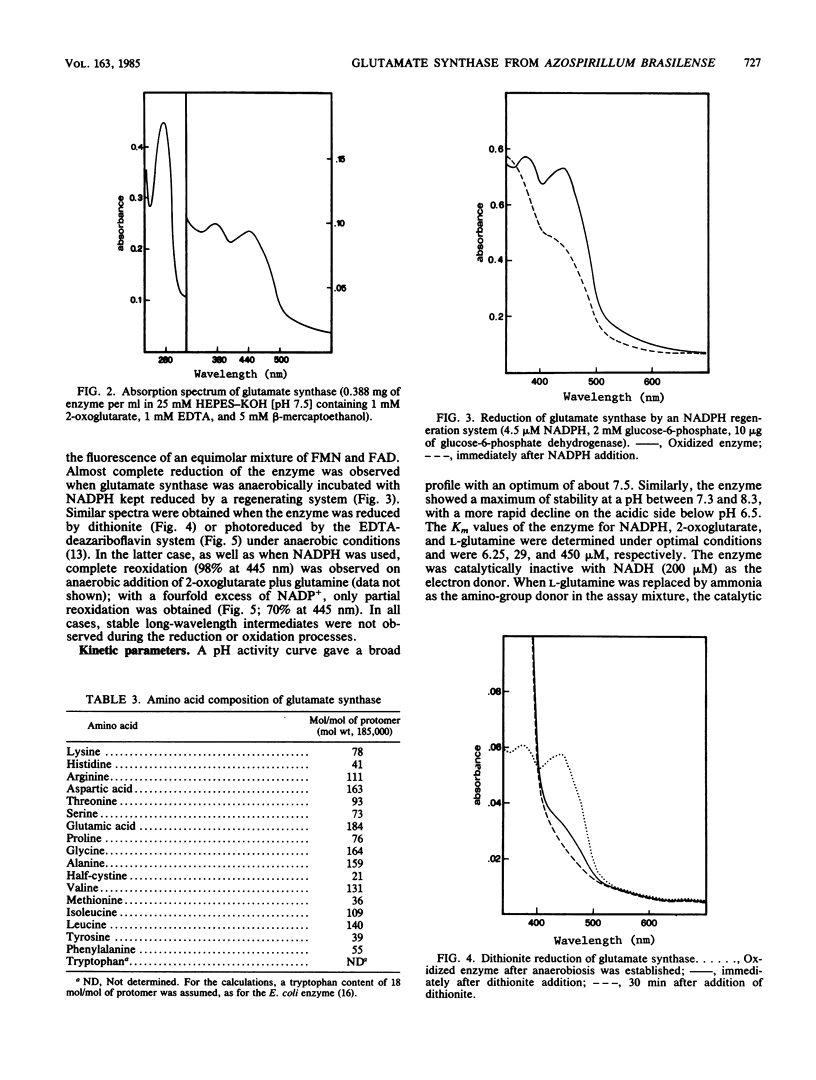
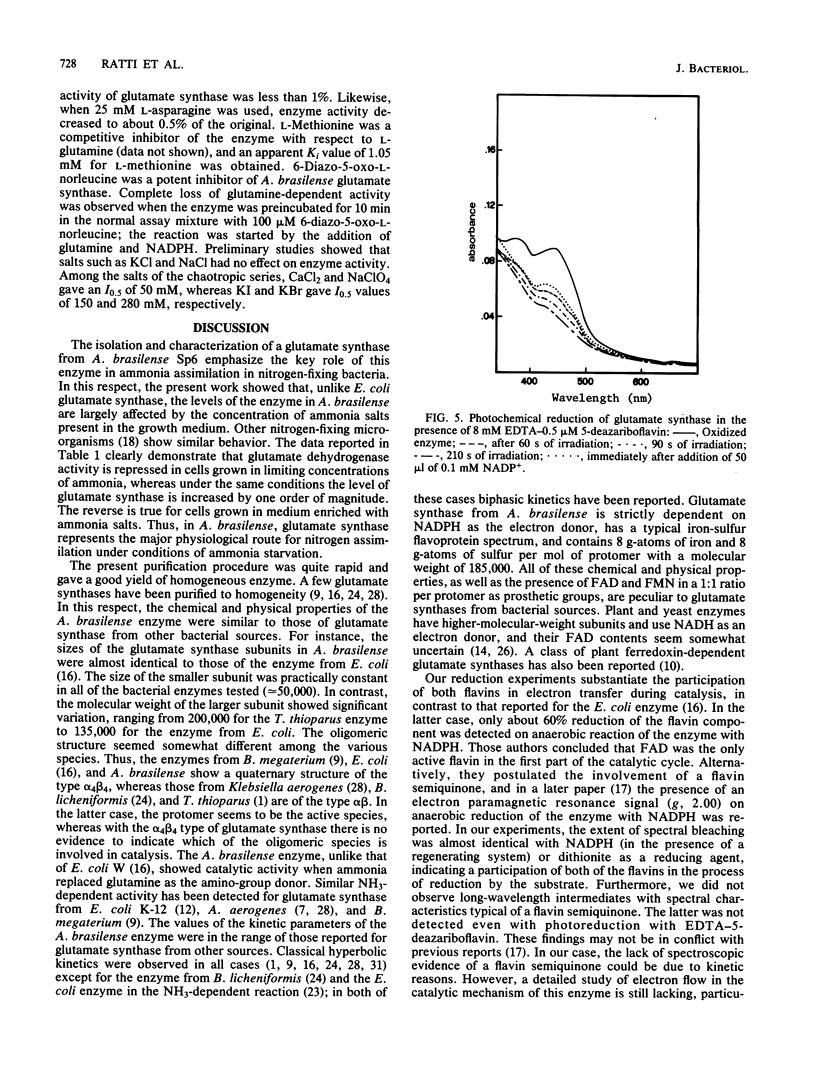
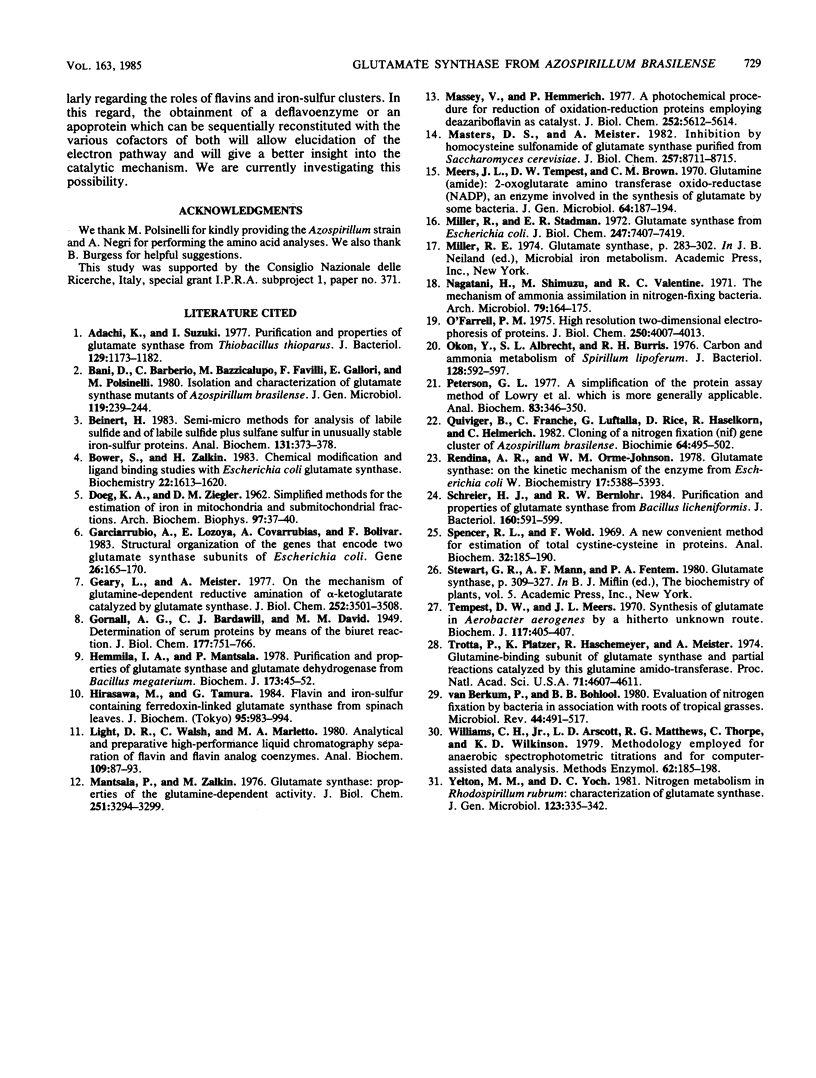
Selected References
These references are in PubMed. This may not be the complete list of references from this article.
- Adachi K., Suzuki I. Purification and properties of glutamate synthase from Thiobacillus thioparus. J Bacteriol. 1977 Mar;129(3):1173–1182. doi: 10.1128/jb.129.3.1173-1182.1977. [DOI] [PMC free article] [PubMed] [Google Scholar]
- Beinert H. Semi-micro methods for analysis of labile sulfide and of labile sulfide plus sulfane sulfur in unusually stable iron-sulfur proteins. Anal Biochem. 1983 Jun;131(2):373–378. doi: 10.1016/0003-2697(83)90186-0. [DOI] [PubMed] [Google Scholar]
- Bower S., Zalkin H. Chemical modification and ligand binding studies with Escherichia coli glutamate synthase. Biochemistry. 1983 Mar 29;22(7):1613–1620. doi: 10.1021/bi00276a014. [DOI] [PubMed] [Google Scholar]
- DOEG K. A., ZIEGLER D. M. Simplified methods for the estimation of iron in mitochondria and submitochondrial fractions. Arch Biochem Biophys. 1962 Apr;97:37–40. doi: 10.1016/0003-9861(62)90041-3. [DOI] [PubMed] [Google Scholar]
- Garciarrubio A., Lozoya E., Covarrubias A., Bolivar F. Structural organization of the genes that encode two glutamate synthase subunits of Escherichia coli. Gene. 1983 Dec;26(2-3):165–170. doi: 10.1016/0378-1119(83)90186-5. [DOI] [PubMed] [Google Scholar]
- Geary L. E., Meister A. On the mechanism of glutamine-dependent reductive amination of alpha-ketoglutarate catalyzed by glutamate synthase. J Biol Chem. 1977 May 25;252(10):3501–3508. [PubMed] [Google Scholar]
- Hemmilä I. A., Mäntsälä P. I. Purification and properties of glutamate synthase and glutamate dehydrogenase from Bacillus megaterium. Biochem J. 1978 Jul 1;173(1):45–52. doi: 10.1042/bj1730045. [DOI] [PMC free article] [PubMed] [Google Scholar]
- Hirasawa M., Tamura G. Flavin and iron-sulfur containing ferredoxin-linked glutamate synthase from spinach leaves. J Biochem. 1984 Apr;95(4):983–994. doi: 10.1093/oxfordjournals.jbchem.a134725. [DOI] [PubMed] [Google Scholar]
- Light D. R., Walsh C., Marletta M. A. Analytical and preparative high-performance liquid chromatography separation of flavin and flavin analog coenzymes. Anal Biochem. 1980 Nov 15;109(1):87–93. doi: 10.1016/0003-2697(80)90014-7. [DOI] [PubMed] [Google Scholar]
- Massey V., Hemmerich P. A photochemical procedure for reduction of oxidation-reduction proteins employing deazariboflavin as catalyst. J Biol Chem. 1977 Aug 25;252(16):5612–5614. [PubMed] [Google Scholar]
- Masters D. S., Jr, Meister A. Inhibition of homocysteine sulfonamide of glutamate synthase purified from Saccharomyces cerevisiae. J Biol Chem. 1982 Aug 10;257(15):8711–8715. [PubMed] [Google Scholar]
- Meers J. L., Tempest D. W., Brown C. M. 'Glutamine(amide):2-oxoglutarate amino transferase oxido-reductase (NADP); an enzyme involved in the synthesis of glutamate by some bacteria. J Gen Microbiol. 1970 Dec;64(2):187–194. doi: 10.1099/00221287-64-2-187. [DOI] [PubMed] [Google Scholar]
- Miller R. E., Stadtman E. R. Glutamate synthase from Escherichia coli. An iron-sulfide flavoprotein. J Biol Chem. 1972 Nov 25;247(22):7407–7419. [PubMed] [Google Scholar]
- Mäntsälä P., Zalkin H. Glutamate synthase. Properties of the glutamine-dependent activity. J Biol Chem. 1976 Jun 10;251(11):3294–3299. [PubMed] [Google Scholar]
- Nagatani H., Shimizu M., Valentine R. C. The mechanism of ammonia assimilation in nitrogen fixing Bacteria. Arch Mikrobiol. 1971;79(2):164–175. doi: 10.1007/BF00424923. [DOI] [PubMed] [Google Scholar]
- O'Farrell P. H. High resolution two-dimensional electrophoresis of proteins. J Biol Chem. 1975 May 25;250(10):4007–4021. [PMC free article] [PubMed] [Google Scholar]
- Okon Y., Albrecht S. L., Burris R. H. Carbon and ammonia metabolism of Spirillum lipoferum. J Bacteriol. 1976 Nov;128(2):592–597. doi: 10.1128/jb.128.2.592-597.1976. [DOI] [PMC free article] [PubMed] [Google Scholar]
- Peterson G. L. A simplification of the protein assay method of Lowry et al. which is more generally applicable. Anal Biochem. 1977 Dec;83(2):346–356. doi: 10.1016/0003-2697(77)90043-4. [DOI] [PubMed] [Google Scholar]
- Quiviger B., Franche C., Lutfalla G., Rice D., Haselkorn R., Elmerich C. Cloning of a nitrogen fixation (nif) gene cluster of Azospirillum brasilense. Biochimie. 1982 Jul;64(7):495–502. doi: 10.1016/s0300-9084(82)80165-x. [DOI] [PubMed] [Google Scholar]
- Rendina A. R., Orme-Johnson W. H. Glutamate synthase: on the kinetic mechanism of the enzyme from Escherichia coli W. Biochemistry. 1978 Dec 12;17(25):5388–5393. doi: 10.1021/bi00618a011. [DOI] [PubMed] [Google Scholar]
- Schreier H. J., Bernlohr R. W. Purification and properties of glutamate synthase from Bacillus licheniformis. J Bacteriol. 1984 Nov;160(2):591–599. doi: 10.1128/jb.160.2.591-599.1984. [DOI] [PMC free article] [PubMed] [Google Scholar]
- Spencer R. L., Wold F. A new convenient method for estimation of total cystine-cysteine in proteins. Anal Biochem. 1969 Oct 15;32(1):185–190. doi: 10.1016/0003-2697(69)90123-7. [DOI] [PubMed] [Google Scholar]
- Tempest D. W., Meers J. L., Brown C. M. Synthesis of glutamate in Aerobacter aerogenes by a hitherto unknown route. Biochem J. 1970 Apr;117(2):405–407. doi: 10.1042/bj1170405. [DOI] [PMC free article] [PubMed] [Google Scholar]
- Trotta P. P., Platzer K. E., Haschemeyer R. H., Meister A. Glutamine-binding subunit of glutamate synthase and partial reactions catalyzed by this glutamine amidotransferase. Proc Natl Acad Sci U S A. 1974 Nov;71(11):4607–4611. doi: 10.1073/pnas.71.11.4607. [DOI] [PMC free article] [PubMed] [Google Scholar]
- Williams C. H., Jr, Arscott L. D., Matthews R. G., Thorpe C., Wilkinson K. D. Methodology employed for anaerobic spectrophotometric titrations and for computer-assisted data analysis. Methods Enzymol. 1979;62:185–198. doi: 10.1016/0076-6879(79)62217-6. [DOI] [PubMed] [Google Scholar]
- van Berkum P., Bohlool B. B. Evaluation of nitrogen fixation by bacteria in association with roots of tropical grasses. Microbiol Rev. 1980 Sep;44(3):491–517. doi: 10.1128/mr.44.3.491-517.1980. [DOI] [PMC free article] [PubMed] [Google Scholar]


